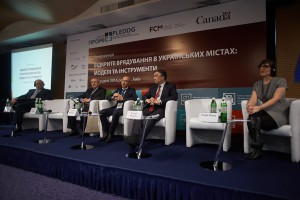 On 7-8 December 2016 Kyiv hosted a conference “Implementing Open Governance in Ukrainian Cities: Models and Instruments”, organized by PLEDDG Project. The main objective of the conference was to discuss and generalize direct democratic governance models already implemented in Ukraine as well as to present international best practices and discuss their application in Ukrainian context.
On 7-8 December 2016 Kyiv hosted a conference “Implementing Open Governance in Ukrainian Cities: Models and Instruments”, organized by PLEDDG Project. The main objective of the conference was to discuss and generalize direct democratic governance models already implemented in Ukraine as well as to present international best practices and discuss their application in Ukrainian context.
Among more than 100 participants, there were representatives of Canadian Embassy in Ukraine, national government authorities, the Federation of Canadian Municipalities (FCM), Association of Ukrainian Cities (AUC), the National Academy of Public Administration under President of Ukraine, international technical assistance projects, PLEDDG partner cities, and leading Ukrainian experts. Besides that, a number of Canadian and Polish experts participated in the conference, who shared their international experience in decentralization and effective models of municipal administration.
Opening address and welcoming remarks were made by Roman Waschuk, Ambassador of Canada to Ukraine, Valeriy Prokopets, Head of Administrative Service Development for the Department of Promotion of Entrepreneurship and Regulatory Policy of the Ministry of Economic Development and Trade of Ukraine, Vasyl Kuybida, President of the National Academy of Public Administration, and Kadie Ward, PLEDDG Senior Governance Advisor.
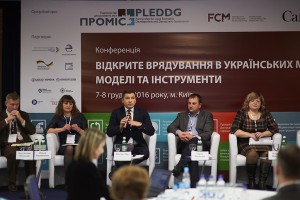 Vyacheslav Tolkovanov, Head of the Center for Cooperation Development of Territorial Communities, presented 12 principles of good governance in EU member states. Viktor Liakh, President of “Eastern Europe Foundation”, Mykhaylo Nakhod, Executive Director of Open City Association, and Taras Yakovlev, Deputy Mayor of Lutsk city, shared their experience in open governance tools and the corresponding experience of Ukrainian cities. Maryna Matsenko, Senior Expert for Administrative Service Development for the Department of Promotion of Entrepreneurship and Regulatory Policy of the Ministry of Economic Development and Trade of Ukraine, talked about the centers for administrative services operating in Ukrainian cities and shared her thoughts on improving the delivery of such services in Ukraine. Kostyantyn Ploskyy, Head of the Foundation of Polish-Ukrainian Cooperation, and Olha Borysenko, Deputy Mayor of Poltava city, talked about problems and prospects of participatory budgeting in Ukraine.
Vyacheslav Tolkovanov, Head of the Center for Cooperation Development of Territorial Communities, presented 12 principles of good governance in EU member states. Viktor Liakh, President of “Eastern Europe Foundation”, Mykhaylo Nakhod, Executive Director of Open City Association, and Taras Yakovlev, Deputy Mayor of Lutsk city, shared their experience in open governance tools and the corresponding experience of Ukrainian cities. Maryna Matsenko, Senior Expert for Administrative Service Development for the Department of Promotion of Entrepreneurship and Regulatory Policy of the Ministry of Economic Development and Trade of Ukraine, talked about the centers for administrative services operating in Ukrainian cities and shared her thoughts on improving the delivery of such services in Ukraine. Kostyantyn Ploskyy, Head of the Foundation of Polish-Ukrainian Cooperation, and Olha Borysenko, Deputy Mayor of Poltava city, talked about problems and prospects of participatory budgeting in Ukraine.
International best practices in local self-governance, local economic development, investment attraction, strategic planning etc. were presented by Berry Vrbanovic, Mayor of Kitchener (Ontario province, Canada), Chris Goertzen, Mayor of Steinbach and the President of the Association of Manitoba Municipalities, Meg Shields, Senior Corporate and Management Policy Consultant, City of Toronto (Ontario province, Canada), and Urszula Mayevska, expert in municipal development (Poland).
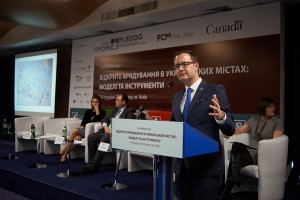 In his speech, Chris Goertzen stressed that involving the community in urban management and accountability of the government makes the municipality stronger and more efficient, as well as it increases public trust in the government. Berry Vrbanovic encouraged Ukrainian colleagues to push for reforms by saying that with challenges come opportunities. Meg Shields shared her expertise in open governance. She stressed the necessity of active citizen participation in the decision-making process in order to get a broader spectrum of different ideas and a comprehensive analysis of critical issues and city development priorities.
In his speech, Chris Goertzen stressed that involving the community in urban management and accountability of the government makes the municipality stronger and more efficient, as well as it increases public trust in the government. Berry Vrbanovic encouraged Ukrainian colleagues to push for reforms by saying that with challenges come opportunities. Meg Shields shared her expertise in open governance. She stressed the necessity of active citizen participation in the decision-making process in order to get a broader spectrum of different ideas and a comprehensive analysis of critical issues and city development priorities.
Canadian experience of democratic governance was supplemented by a European model of reforms. Polish expert Urszula Mayevska shared Poland’s open governance models and success stories. According to Ms. Mayevska, Polish government has come up with an effective mechanism of public consultations, which enabled the community to express their opinion on different aspects of community life. 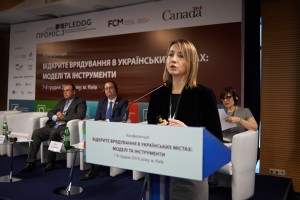 Active citizen participation contributes to good governance. According to Polish expert, in Poland, city residents can initiate public consultations whenever they wish. Polish authorities interact actively with various non-governmental organizations and work together on a number of important public initiatives.
Active citizen participation contributes to good governance. According to Polish expert, in Poland, city residents can initiate public consultations whenever they wish. Polish authorities interact actively with various non-governmental organizations and work together on a number of important public initiatives.
PLEDDG experts Kadie Ward and Ihor Lepyoshkin presented a document titled “Methodological approach to development and implementation of an integrated open governance model in Ukrainian cities” as well as an open governance integrated model based on citizen participation in planning and decision making. Integration of approaches and principles of open governance allows for improving local government’s work, increase public trust in the government due to transparent processes, accountability and dialogue.
After the keynote speeches followed group work in three sessions – citizen participation, government accountability and quality services. During the sessions, participants presented and discussed open governance tools and models
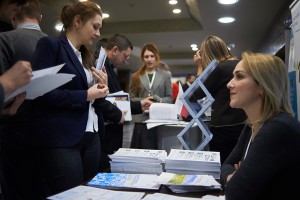 The second day of the conference was dedicated to innovative instruments of open governance and prospects of their implementation in Ukraine. In the course of open discussion, participants discussed the results of group work. The highlights of the second day of the conference was a knowledge fair featuring international projects and programs that provide technical, analytical and consultative support to Ukrainian cities in open governance. The projects included Solidarity Fund PL, USAID PULSE, Open City Association, Eastern Europe Foundation, USAID “Citizens in action”, DESPRO Project, Western NIS Enterprise Fund, GIZ “Reform of Municipal Services in Eastern Ukraine Ukraine”, PAUCI Foundation, USAID DOBRE.
The second day of the conference was dedicated to innovative instruments of open governance and prospects of their implementation in Ukraine. In the course of open discussion, participants discussed the results of group work. The highlights of the second day of the conference was a knowledge fair featuring international projects and programs that provide technical, analytical and consultative support to Ukrainian cities in open governance. The projects included Solidarity Fund PL, USAID PULSE, Open City Association, Eastern Europe Foundation, USAID “Citizens in action”, DESPRO Project, Western NIS Enterprise Fund, GIZ “Reform of Municipal Services in Eastern Ukraine Ukraine”, PAUCI Foundation, USAID DOBRE.
The final remarks were made by PLEDDG Director Oleksandr Kucherenko, who thanked participants for their interest and active involvement and expressed his hope that the knowledge the participants received over the course of the conference would help them in implementing democratic open governance models and ensuring transparent decision-making, which would allow all stakeholders to take an active part in the development and implementation of strategies and local development programs.

